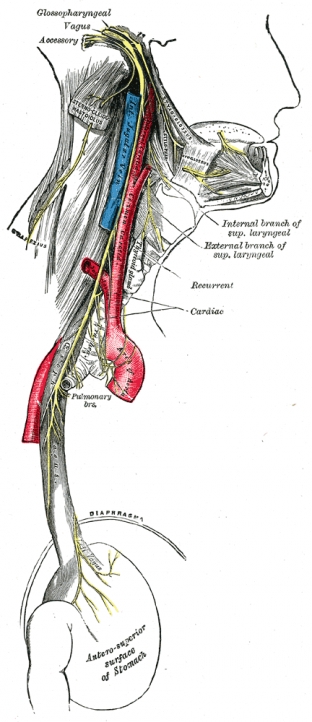When was the last time you had to overcome a stressful situation with dignity? Did you complete this task? Every day there is more evidence that everyday attitudes and behavior can create a positive snowball effect through the feedback loop associated with stimulation of the human vagus nerve.
That is why the editors of Estet-portal decided to tell you about useful habits that will help maintain the tone of the vagus nerve and allow you to maintain calm, composure and composure in tense situations.
- Key Signs of Healthy Vagus Nerve Tone
- What is the vagus nerve
- Vagus Nerve Stimulation as a Way to Stay Calm in Difficult Times stressful situation
Key Signs of Healthy Vagus Nerve Tone
A healthy tone of the vagus nerve is indicated by a slight increase in heart rate as you inhale and a decrease in heart rate as you exhale. Deep diaphragmatic breathing - with a deep and slow exhalation - is the key to stimulating the vagus nerve and slowing the heart rate, lowering blood pressure, mainly in conditions of tension and pressure. High vagal tone is associated with mental and physiological health. Conversely, low vagal tone is associated with inflammation, bad mood, loneliness, and even heart attacks.
It is known that diligent athletes have a higher vagal tone because they engage in aerobic breathing exercises, which lead to a decrease in heart rate.
Heart health is directly related to stimulation of the vagus nerve, since during the latter the production of a substance called “vagus nerve substance” or, in scientific terms, acetylcholine is triggered. By the way, this substance is the first neurotransmitter discovered by scientists.
Acetylcholine by its nature is a tranquilizer that is introduced into the body only under the influence of several deep breaths and slow exhalations. You can consciously regulate the action of the vagus nerve to calm yourself when needed. Awareness of this fact is enough to reduce the fear of fear itself and come out of it with dignity. stressful situation.
What is the vagus nerve
The vagus nerve gets its name because from its trunk, located in the cerebellum, there are a large number of branches, as well as the brain stem, which reaches the organs located at the very bottom of the abdominal cavity, affecting the main large organs along the way.
The vagus nerve constantly sends sensitive information about the state of the body's organs to the brain. In fact, 80-90% of the nerve fibers in the vagus nerve are dedicated to transmitting information from the internal organs to the brain.

The same communication chain exists in the opposite direction - messages from the brain to the internal organs are also sent through the vagus nerve, the content of which is a command to calm down or prepare for defense in stressful situations.
Your vagus nerve is the commander-in-chief that helps you stay calm in stressful situations. The autonomic nervous system consists of two diametrically opposed systems that engage in a kind of “tug of war” that provides the body with the ability to maintain homeostasis.
The sympathetic nervous system is aimed at accelerating the body's functioning, acting as a kind of gas pedal - it stimulates the production of adrenaline and cortisol in response to stress. The parasympathetic nervous system performs the opposite function. The vagus nerve is the central control point of the parasympathetic nervous system. It is a kind of brake that slows down the body and uses neurotransmitters (acetylcholine and GABA) to lower heart rate, blood pressure and slow down organ function.
Unfortunately, the reflex reactions of the vagus nerve can play a cruel joke on a person. Every time you stress yourself out before an important event, are nervous or worried, the vagus nerve perceives this as a danger, which intensifies such negative reactions.
All the physical symptoms of fear of possible failure - a racing heart, sweaty palms, dry mouth, an unpleasant feeling in the stomach, jitters - are the result of the vagus nerve. Luckily, you can control your vagus nerve to help you stay calm in life. stressful situation.
Stimulation of the vagus nerve as a way to remain calm in a difficult stressful situation
- Vagus Nerve Imaging
Visualizing the vagus nerve as the source of the neurobiological components that create a sense of mental and physical calm can help you gain control. The success of such an exercise lies not only in the placebo effect. Remember, every time you take a deep breath, you trigger the release of a vagus nerve substance that lowers your heart rate and blood pressure. You can try to calm your vagus nerve by addressing it as if it were a living being.
- Constant practice
Your cerebellum stores muscle memory and helps you stay calm in stressful situations. Without consistent practice, we are forced to over-rely on the executive function of the prefrontal cortex.
The more you think about something, the more restless your body's reaction is. This is called "analysis paralysis."
- Balance between skills and task
The key to a state of calm is finding the sweet spot where your skill level exactly matches the task at hand. Make it a habit to gradually expand your boundaries. By gradually increasing the complexity of the tasks, you will be able to improve your skills and adapt them to increasingly complex tasks.
Come up with tasks for yourself that do not cause much fear, but do not make you bored.
- Reconsider priorities and values
Friends, family, good health and generosity play an important role in maintaining calm in stressful situations. Make it a habit to reconsider the importance of an event from a broader perspective, taking into account other things that are important to you. Even if the stakes are high, remember that every failure is an opportunity to learn a valuable lesson.

- Use neuroplasticity to develop positive thinking
Positive emotions and acquired optimism reprogram the neural networks associated with psychological mood, which will help you stay calm in stressful situations. The vagus nerve carries signals from your organs to your brain and back and uses them to rewire your brain through neuroplasticity.
- Daily physical activity
Cardiorespiratory activity, strength training, and yoga stimulate vagal tone and balance hormones and neurotransmitters associated with staying calm in stressful situations. Aerobic activity stimulates healthy vagal tone through proper diaphragmatic breathing during rhythmic cardiorespiratory exercise. Strength training that focuses on strong exhalation helps stimulate vagal tone.
Yoga also improves vagus nerve tone. In addition, it is effective in treating patients with physiological and medical problems associated with stress - depression, anxiety, high blood pressure and heart disease.

There is a hypothesis that stress leads to an imbalance in the autonomic nervous system (insufficient activity of the parasympathetic nervous system and increased activity of the sympathetic nervous system), as well as insufficient activity of the inhibitory neurotransmitter GABA.
Eastern and Western medicine merged together in yoga. Yoga is known to be able to combat nervous system imbalances associated with stress.
- Anxiety is Contagious: Avoid Anxious People
Especially before an important event. Since anxiety spreads from person to person, it is better to protect yourself from people who are negative, cynical, or doubt your abilities.
If this is not possible (for example, in waiting rooms, before an interview or exam), use headphones. Turn on your favorite music, close your eyes and don’t let other people’s experiences spill over to you. In general, protect your vagus nerve from negative vibes in every possible way.

- Cultivate love and kindness within yourself
To maintain healthy vagal tone, it is important to create and maintain positive social connections. Good vagal tone is directly linked to positive emotions, physical health, and positive social connections.
Conclusion: The Vagus Nerve and Self-Control
Composure, calm, and equanimity have their biological roots in the vagus nerve and are equated with remaining calm in stressful situations.
So use your vagus nerve to maintain balance and calm. He will always help you to be steadfast and maximize your potential.
We hope that the above tips will help you use the incredible capabilities of your vagus nerve and remain calm in stressful situations.








Add a comment